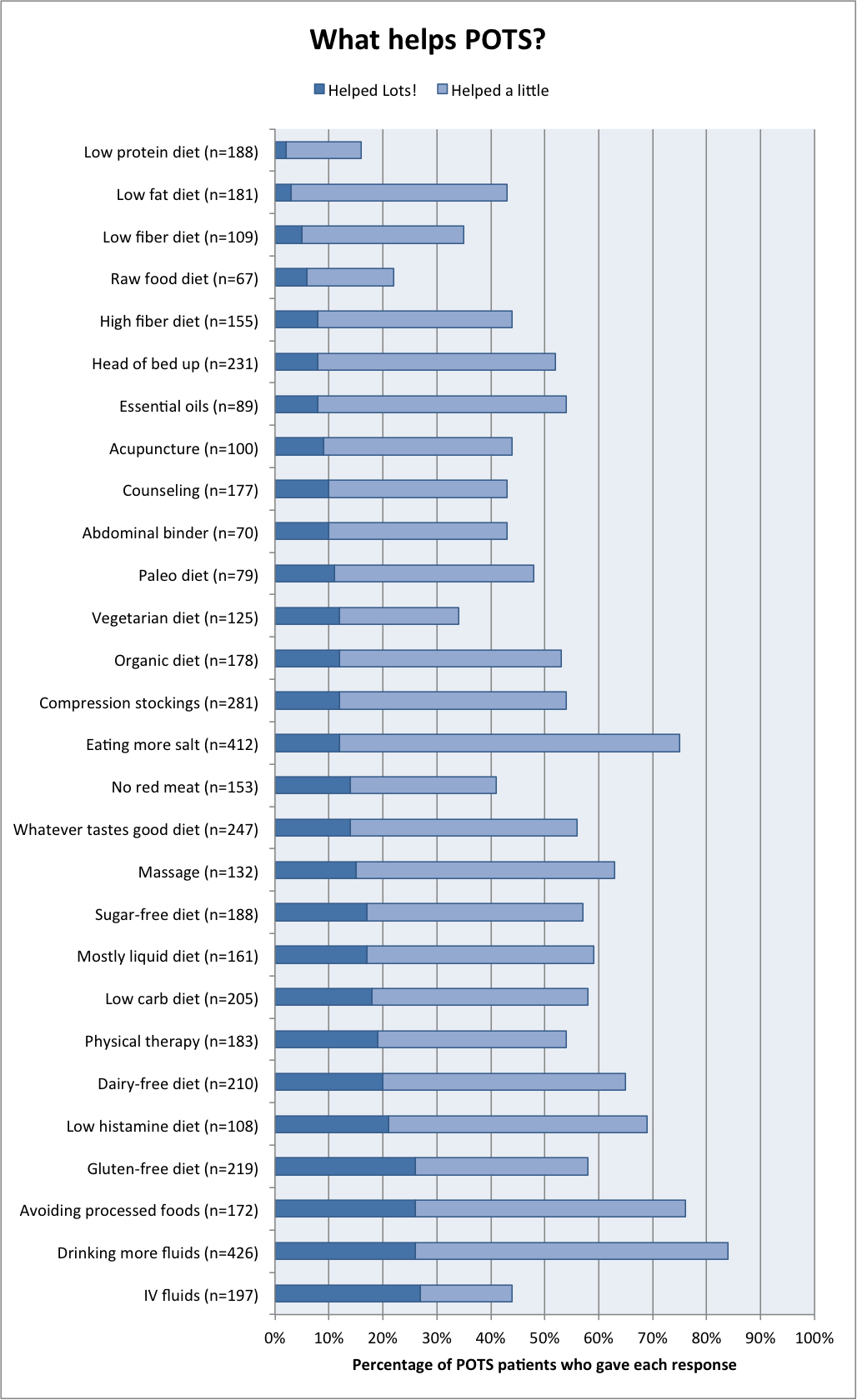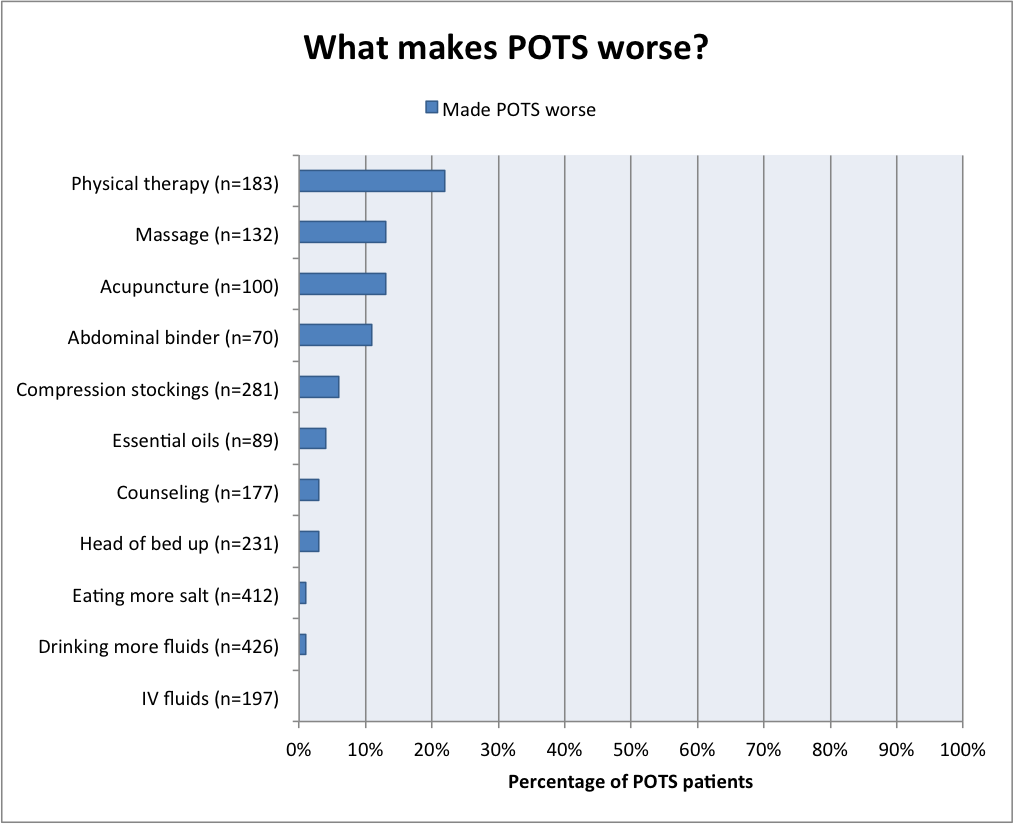What helped POTS?!
Many POTS patients have spent years experimenting with various diets, lifestyle changes and alternative therapies, in search of relief. It can get exhausting, expensive and time-consuming. In hopes of making future quests more efficient, we used the POTS Patient-Powered Survey to ask 450 patients about how 28 different practices had affected their POTS symptoms.
The chart below summarizes responses. I like to keep in mind that this single chart represents the experiences of 450 patients, who each had to learn this stuff over months or years of trial and error. It's substantial.
But first, a bit of explanation: For each therapy listed, all 450 participants were asked whether they had tried it (the number "n" indicates the number who had.) Then, only if they had tried it, they rated whether it had helped manage their POTS. Choices were:
- Helped Lots!
- Helped a little
- Didn't help
- Made my POTS worse
Below are the results, showing the percentage of patients reporting each therapy as helpful:

What stands out most is how every single therapy helped at least 15% of those who tried it. There were no absolute duds. It makes us wonder if just trying anything is therapeutic. I know I feel better when I've got hope that my current experiment will lead to improvement.
We also found it interesting that no single therapy "helped lots!" for more than 28% of patients. Ratings of "helped a little" were more prevalent for each therapy. The only exception was IV fluids, which was unique because when it helped at all, it was more likely to "help lots."
Also interesting was the general lack of consensus. For example, the low-fiber diet helped about as many patients as the high-fiber diet. The "whatever tastes good" diet scored about the same as several restrictive diets.
Most therapies helped some patients, but nothing helped everyone. The top ratings went to increased fluid and salt consumption and avoiding processed foods, which were all rated as helpful by more than 70% of patients. The helpfulness of consuming extra salt and fluid is perhaps not surprising, given that these practices are practically the POTS motto. The helpfulness of avoiding processed foods, however, is rather exciting because this approach is not widely suggested by POTS experts. In fact, many doctors have been known to endorse eating potato chips, pretzels, Gatorade and other highly processed foods, to boost salt and fluid intake. Giving up processed foods is good for many different aspects of health, so getting improved POTS symptoms is an added bonus.
Even though no "magic bullets" emerged, it's promising that all 28 therapies helped at least some patients, and that we could combine many therapies with a potentially additive effect. For example, one could adopt a low-histamine sugar-free, low-carb, unprocessed diet, and combine it with physical therapy, massage and compression stockings. Small gains from each practice could add up to big improvements.
However, if you decide to experiment, it's important to consult your doctor first and consider possible risks. Some therapies can backfire. Below is a chart showing what percentage of POTS patients reported that each therapy (except for the diets) "made my POTS worse."

Because we did not ask for details, we don't know the severity of negative reactions. The only therapy that had no reports of "made POTS worse" was IV fluids. However, that doesn't mean people didn't have any side-effects. Getting IV fluids (and any therapy) can have risks that were not captured here because they didn't specifically affect POTS symptoms.
Finally, the subset of POTS patients who tried each therapy may have had specific reasons to do so. In other words, the sample of patients who tried each therapy weren't necessarily representative of all POTS patients. As always, talk to your doctor about which therapies are safe for you to try.
What helped most for different kinds of POTS patients?
After seeing the overall "What Helps POTS" data, we were curious whether it would differ depending on whether patients attributed their POTS to Ehlers-Danlos syndrome, mast cell activation disorder, autoimmune disorders, or other underlying factors. So we made the helpfulness charts separately for each group, and you can find them here.
We have 25+ more findings here, about many rarely-studied aspects of POTS. To receive occasional email updates on new findings, you can sign up on our homepage. Please tell us your thoughts via our contact page or learn more about us here Be well!